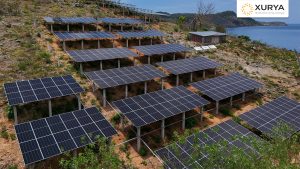by: Agustinus Beo da Costa
Jakarta—Indonesia faces a major challenge in achieving a just and orderly energy transition. Chairman of the Indonesia Clean Energy Forum Bambang Brodjonegoro emphasised that this step is crucial to keeping global temperature rise below 1.5 degrees Celsius. The energy transition is about the environment and includes social and economic dimensions, ensuring that no one is left behind, especially those most vulnerable to change impacts.
The energy transition is integral to the Golden Indonesia Vision 2045, which aims to lift Indonesia out of the middle-income trap. By integrating sustainable practices, the government intends to achieve 8% annual economic growth through the Asta Cita plan. As a key driver, the energy transition is expected to create new jobs and improve economic competitiveness.
In this context, the Low Carbon Development Indonesia (LCDI) study by Bappenas confirms that economic drivers based on clean energy will reduce pressure on environmental carrying capacity. By doing so, Indonesia can pave the way for sustainable and resilient growth across sectors.
Ministry of Energy and Mineral Resources Focus
The Ministry of Energy and Mineral Resources (MEMR) has developed a roadmap towards net-zero emission, with three main pillars: energy efficiency, renewable energy, and a moratorium on steam power plants. Eniya Listiani Dewi, Director General of New and Renewable Energy, highlighted the importance of partially utilising biomass to replace coal consumption. Currently, biomass consumption has only reached 600,000 tons out of a target of 2.2 million tons, so there needs to be a significant acceleration.
Energy efficiency is also a major concern. Energy management is required in various buildings in Jakarta, and the Ministry of Energy and Mineral Resources is targeting a 32% reduction in emissions. Next year, two new regulations will be issued to strengthen energy management, demonstrating the government’s strong commitment to energy efficiency.
Lessons from the UK
Dominic Jermey, British Ambassador to Indonesia, shares his country’s experience in eliminating reliance on coal-fired power plants. The UK reduced its coal use from 40% to zero in twelve years. This shows that the energy transition can be made quickly and efficiently with technology, innovative policies and private-sector support.
Jermey also highlighted the importance of creating a conducive investment environment for renewable energy. The government must provide legal certainty and attractive policies for the private sector to invest in clean energy projects. In addition, the UK is ready to share knowledge and technology to support Indonesia in achieving its energy transition targets.
Indonesia Energy Transition Dialog 2024 recommendations
Fabby Tumiwa, Executive Director of IESR, presented nine important recommendations, divided into short and long-term, at the end of the Indonesia Energy Transition Dialog (IETD) 2024. The annual event is a discussion forum for stakeholders from various sectors to formulate clear policy directions and strategic steps towards a green economy.
Short-term recommendations include developing a cost-effective energy transition roadmap, regulatory acceleration, energy subsidy reform, and eliminating the diesel program. Switching from diesel power generation to renewable energy is essential to improving electricity access in remote areas and reducing dependence on imported fuels.
On the other hand, long-term recommendations involve energy diplomacy to attract investment and technology transfer, transformation of the industry’s business model, and development of human resources that suit the needs of the clean energy sector. According to Fabby, this will ensure that Indonesia can compete in the global market and fully utilize the potential of renewable energy.
Broad participation from various community groups is also an important aspect of the energy transition. Fabby emphasised the need for the involvement of indigenous peoples, youth, academics, and the media in energy policy decision-making. This will not only increase transparency but also ensure that the energy transition is carried out in an inclusive and equitable manner.
The energy transition is an excellent opportunity for Indonesia to create a sustainable economy, attract investment and improve people’s welfare. Collaboration between the government, communities and other stakeholders is critical to the success of this process. With the right strategy and strong commitment, Indonesia can realise its future vision as a leader in clean energy and sustainable development.















